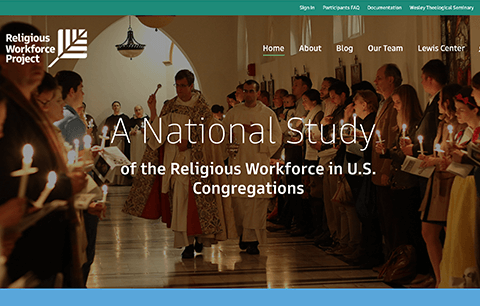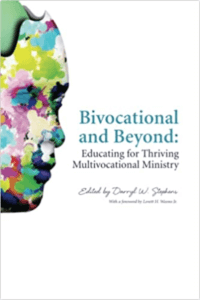
Can bivocational ministry be a strategic choice and not just a reluctant concession to financial constraints? Ben Connelly shares how bivocational ministry can enhance collaboration, deepen engagement with the mission field, and even promote the personal spiritual growth of those who practice bivocational ministry.
Listen on Apple Podcasts | YouTube Music | Spotify
Watch on YouTube

- Transcript — Click or Tap to Read
-
Announcer: Leading Ideas Talks is brought to you by the Lewis Center for Church Leadership of Wesley Theological Seminary in Washington, DC. Subscribe free to our weekly e-newsletter, Leading Ideas, at churchleadership.com/leadingideas.
Leading Ideas Talks is also brought you by the Religious Workforce Project. Building on previous research, this study is an unprecedented effort to understand the nation’s religious workforce in a comprehensive way. The Project includes a national meta-analysis and a qualitative study in the Washington, DC, metro area. Funding for the project is generously provided by The Lilly Endowment, Inc. Learn more at religiousworkforce.com.
Can bivocational ministry be a strategic choice and not just a reluctant concession to financial constraints? In this episode, Ben Connelly shares how bivocational ministry can enhance collaboration, deepen engagement with the mission field, and even promote the personal spiritual growth of those who practice bivocational ministry.
Ann Michel: I’m Ann Michel. I’m a senior consultant with the Lewis Center for Church Leadership of Wesley Theological Seminary. I’m one of the editors of Leading Ideas e-newsletter, and I am so pleased to be the host of this episode of Leading Ideas Talks. I’m talking today with Ben Connelly who is founder of The Equipping Group, which provides resources and training to ministry leaders and church planters. He’s one of the leaders of the Salt+Light Community in Fort Worth, Texas. And he was a contributor to a recent book on bivocational ministry called Bivocational and Beyond: Educating for Thriving Multivocational Ministry. He himself has been a practitioner of bivocational ministry for the past 20 years. And that’s the subject of our conversation today. So welcome to you, Ben.
Ben Connelly: Yeah, thank you. I’m honored to be with you today and honored to get to learn from you as well as we chat.
Ann Michel: Thank you. I want to begin by saying that many people, particularly I think in the mainline denominations, think of bivocational ministry as something that neither a pastor nor a congregation would choose, at least not for its principal leaders, unless they had to. It’s a reluctant choice that’s often made out of financial necessity. But other congregations and ministry leaders are opting for bivocational ministry as a strategic choice. So, I wanted to ask if you could describe what that looks like in your own work in the faith community you serve.
Ben Connelly: Yeah, I think you nailed it. Especially in our more Western, still coming-out-of-Christendom context at least, the ideal, the kind of standard for church work, is that it’s full time. And what’s interesting is that in a lot of places around the world that’s not true. And through history that hasn’t necessarily been true, as well. But it is certainly the norm for us, so anything other than that, even if it has been true globally and historically, doesn’t feel like the norm for us.
Yet I think, for my own life, I stepped into bivocational ministry when we planted a church. For one of the reasons you mentioned, I didn’t want to put the whole burden of finances on our brand-new, little church plant. Of course, church planting is risky in a lot of ways, and finance is always a question for any church planter, so one of the ways that I personally chose to try to mitigate some of the risk there is to take a bivocational job. I got to teach at a local university. And what ended up happening is, I realized that while my motive for becoming bivocational was financial, all of these other really sweet things started happening as far as being able to engage a mission field. I was spiritually formed even through that, even though kind of having limited time and kind of a split week, if I can say it like that. For me, while the motive was very similar to what you described, what I personally experienced was just a whole lot of God’s grace and unique benefits that came through intentionally pursuing bivocationality.
Ann Michel: I think you’ve mentioned that in the church context in which you’re serving there are many people serving bivocationally. Can you describe what that looks like?
Ben Connelly: Yeah. At our church we have only two of us that are paid at all. I’m a day or day-and-a-half a week. We have another woman who’s paid a day or day-and-a-half a week to carry some of the day-to-day operations and “ministry load.” But then we have folks giving anywhere, you know, between flexible jobs and some of this kind of stuff — we have a team of five or six folks who are able to give three, five, eight, ten hours a week, which feels unique in some ways. But I think also in many of our churches there would be folks who could offer something and stay kind of in their lane, in their specific area of gifting or passion for five, six, ten, hours a week. But a lot of times they don’t know they can. They’re not given the permission. Or they’re not invited into that. And so, we have essentially a bivocational leadership team that would be more than a full-time person or two full-time people. But it’s everybody kind of bringing their best to the table.
Ann Michel: And these are paid roles as distinct from volunteer leadership positions?
Ben Connelly: Some are, and some aren’t. We have a little bit of a hybrid, and this is specific to us. This isn’t necessarily a principle, but we’ve chosen to not really focus a ton on staff distinction versus non-staff, rather kind of going like, hey, everyone has some spiritual gifting, so could you bring your best to the body of Christ?
Ann Michel: I love that idea! Within your own ministry and in your own context, what have been some of the benefits you experience as a bivocational minister? You’ve mentioned some, but I wondered if we could explore that a bit more?
Ben Connelly: Yeah. I’m happy to dive into some of those even that I did mention. The first is there has been some freedom for our churches to use finances differently, so we’ve been able to. Just for clarity, I planted a church 12 years ago, and it was bivocational the entire time. And then we planted another church about a year and a half ago and also bivocational. As I talk about our church, there is both some history there and also some newness, so it may sound a little bit confusing. But in both churches, we’ve been able to use some of the finances to bless the neighborhoods that we’ve been meeting in. Or, to use the term benevolence, we’ve been able to try to help folks in need, whether in our community or connected to our mission field or this kind of stuff, in ways that, if I was pulling a full-time salary, if somebody was pulling a full-time salary, we wouldn’t have as much capacity for. So, there is a financial benefit not just for me or the planter but for the church to really use. I can say it like this: Use God’s money for God’s mission. This is how we talk about it a lot.
And then I mentioned briefly that there are some spiritual implications. I think that one of the biggest things I had to learn and a lot of bivocational leaders that I get to work with have to learn is that it takes a lot of humility to say both that I don’t have the literal capacity in a given week to carry everything and that I’m unable to carry out everything that a church or ministry needs. And with that comes a reliance on others, which I think we say is an echo of reliance on the Spirit to do what only God can do. It’s a laying down of self. In some ways, it’s a really beautiful limitation to know that no minister, no person, is good at everything. And so, “I get to …” is the glass-half-full way to say it. “I have to …” is the other way to say that I have to stay within the lanes that I’m gifted and then entrust some of the ministry and mission to others who I know are gifted but who might do it a little bit differently than myself.
Ann Michel: It seems like it really does promote collaboration as opposed to the “one leader-many followers” model of ministry. When you mentioned the spiritual benefits of bivocational ministry, that’s the focus of the chapter you contributed to the book Bivocational and Beyond.
And you share the results of some research you’ve undertaken that found that bivocational ministers often do experience personal spiritual growth. I take it that was an unexpected finding, so I wanted to give you the opportunity to explain a little bit about that — what you learned and why you think it’s important.
Ben Connelly: Yeah, thank you. I think that you’re right. It is the unexpected finding in our survey that got hundreds of pages of data from bivocational ministers, and nobody said, “I want to be bivocational for my own spiritual benefit.” It was always something like finances, whether the church’s or personal finances, or that, in terms of stage of life, it made the most sense for them or they were working through school. It was all these kinds of practical or even missional motivations. They wanted to be bivocational so they could be in the world and not just, in one person’s words, “walled away in the church.” So, that’s a lot of the motives. And if anybody listening or watching this is bivocational or pursuing that, those are probably often, statistically at least, a lot of the reasons that we would think that.
But what almost all of them found is that being bivocational did spiritually form them. They found it to be a personally sanctifying thing, along the same lines I’ve already mentioned. Humility and dependence grow the need for a team, which is also just to say “I can’t do everything on my own. I need others,” and then even sanctification to say, “There’s not a separation,” as one person said, “between the holy and the unholy parts of my life.” By living incarnationally and having a job in the “secular world,” I’m practicing incarnational living like Jesus did. And one person even said, and I can resonate with this, “It reminds me of what everybody else in my congregation experiences.”
Ann Michel: Yeah. That’s a very good point. I’ve done a lot of work around more inclusive paradigms of ministry. I’m a lay person in professional ministry, which is one reason that’s a particular interest of mine. And I do think that the more we rely on full-time clergy, the more we dichotomize the sacred and the secular because we think that the important spiritual work happens within the church as opposed to in the world. And there’s a lot of history around that idea, especially with the Protestant Reformation and other things. It’s a really interesting area.
You know, I’ve worked in part-time ministry roles. Based on that experience, I sometimes say to people, “There’s no such thing as part-time ministry.” And I know that isn’t true, but I do think there’s always a question about how people who are working part-time, or bivocationally, can set reasonable boundaries around what’s expected of them and what they expect of themselves. I wonder if you could speak to that a bit.
Ben Connelly: Yeah, I think you’re certainly hitting on something, according to our results and just even experientially. I could say this; my wife would definitely tell you this. For the ministers we work with, time is the big question. At the same time, I don’t know that it’s just true for bivocational ministers. I’m sure this is true, I know it’s true, for professors. I know it’s true for anyone outside of shift work where you have a clock-in and clock-out time. Even then, I think it’s tough to be able to say, “Okay. I’m turning it on. I’m turning it off.” I don’t know if that was true 30 years ago before we were as connected as we are today. But, certainly, in today’s world everybody is pulled toward overwork, toward even some shame if you’re not working or some undue shame for spending time with family or having a having a life.
What’s really interesting is that several bivocational ministers actually talk about how, if folks in their congregations or folks in their church families know that they have another role, there’s actual been more protection of that time just because of overtly saying, hey, I have these days of the week to give to the church or this many hours a month to give to ministry and the others are, you know, working on cars or serving coffee or being a consultant or teaching or whatever else. The congregation generally responds well to that. So, sometimes, it’s the full-time ministers who have a harder time, whether in their own expectations or others’ expectations, have a harder time turning it off because, well, “You’re my pastor. You’re available 24/7.”
Ann Michel: Yeah, I think that’s probably right. Because if you are truly bivocational that means you have other work or other responsibilities. And you have to enforce a boundary in a way that someone who is a full-time minister may not have to, or people may not think they have to.
Ben Connelly: And even in that, to go back to the personally sanctifying aspect of this — sometimes that means that a person can’t get hold of you because you’re at work, so they call a small group leader or just a fellow follower of Jesus that they know, and that person helps walk them through whatever issue. And that’s really beautiful. That’s the priesthood of all believers. It’s what we want to see happen. Yet, for a lot of ministers, it challenges our very identity. It goes like, “Oh, I like to be the one who helps see the light bulb go on. And what does it do to me if somebody else does that in my stead?” So, there’s even some sanctifying moments there. Is my identity in my role? Is my identity in my function with this person? Or am I able to celebrate: “Hey, this is a really Biblical thing. We’ve equipped the saints for the work of ministry, and they’re doing the ministry. It doesn’t just rely on me.” It’s beautiful theoretically, but it’s hard sometimes.
 Building on previous research, the Religious Workforce Project is an unprecedented effort to understand the nation’s religious workforce in a comprehensive way. The Project includes a national meta-analysis and a qualitative study in the Washington, DC, metro area. Funding for the project is generously provided by The Lilly Endowment, Inc.
Building on previous research, the Religious Workforce Project is an unprecedented effort to understand the nation’s religious workforce in a comprehensive way. The Project includes a national meta-analysis and a qualitative study in the Washington, DC, metro area. Funding for the project is generously provided by The Lilly Endowment, Inc.
Ann Michel: Beyond this issue of setting reasonable boundaries, what are some other common challenges or pitfalls that you find with the bivocational ministers that you train and coach?
Ben Connelly: Time really truly is the biggest one — figuring out what that boundary is and figuring out what the balance is. I think a subset of that is figuring out what type of second job or perhaps first job fits well. There are certainly jobs that are more flexible or jobs where you do have set shifts and jobs that are more people oriented. Those kinds of jobs typically fit well with bivocational ministry. But jobs that are a little bit more stringent, timewise, or you don’t know which days of the week you’re going to have to work, or this kind of stuff. Maybe they’re less people oriented, so you’re not actually getting to live on mission. You’re in the world but not really in the world, if you know what I mean. So, navigating the type of job that can work well is what I’m trying to say.
I think another difficulty is there are some roles in church leadership that can be more flexible and some needs in church leadership that can’t. In the first church we planted, several of us were bivocational, but we realized we needed to bring kind of a shepherding, more of a counselor, person on to full-time staff. Because you know, I can write a sermon at 11 p.m. if I need to. But it’s hard if not kind of shady to say, “Hey, I’ll meet you for counseling at 11 p.m.” So, recognizing that it’s not for everyone — certain roles, church size, and needs, and this kind of stuff, different seasons, different assignments, holding it loosely, and recognizing that there might be a time or might be a season or might be some specific types of ministry that are harder to navigate if you’re in a bivocational role.
Ann Michel: How about from the congregation’s perspective? What are some of the things that the congregation needs to be mindful of or things that might be challenging?
Ben Connelly: Yeah, I think the boundaries that we’ve already discussed a little bit. And some of that’s just on the minister or ministers to communicate well. If there is shame around being bivocational and so you want to be available all the time but you’re just not, then we on the ministry side of the table can create some undue expectations that we are available whenever you want us when we’re really not. So, I think from the congregation’s perspective, just knowing and respecting those boundaries. I think there is — this is an ideal versus hard kind of thing — there is an ability to say, “Hey, I have a role to play in this church. Not just the minister, not just the person on the stage or in the pulpit or at the altar every week. I have a role to play here. I’m a gifted person with gifts for ministry.” And that can be a really beautiful thing. And also, it’s similarly not the norm in every church or every context. For some congregational folks moving out of more of a consumeristic, “I’m here to receive. What the minister going to give me?”, that can be a challenge, even if it is theologically and biblically what we want to see. It’s not everyone’s experience. And so, it can be a hard expectation.
Ann Michel: Well, that actually leads to the next question that I wanted to ask because the Lewis Center is doing a really major study right now of changes in the religious workforce in America. It’s pretty widely known already that there are many sectors of the church that are seeing a rather significant increase in bivocational ministry, and you have churches that have relied on full-time clergy for decades who are now moving to a part-time or bivocational model, often as a consequence of declining membership. And I’ve also worked and talked with a lot of younger clergy who entered ministry, entered seminary, with the expectation that they would be serving full-time. And now they’re having to shift gears and start to figure out what it might mean to pursue bivocational ministry. I guess the question I wanted to ask is, what would you suggest to congregations or individuals who are having to begin to shift their mindset and reframe their expectations about the way ministry is carried out.
Ben Connelly: Yeah. Oh, man, that’s a really good, hard question, Ann. If I can zoom out for just a moment, one way to frame it is to say that where we’re headed again puts us more in the context of historical and global Christianity than we realize. I was in Australia this summer for three weeks — our summer, their winter — getting to serve with some churches. And of the ministers and churches that we got to work with — we probably got to be with 80 to 100 different ministers in a few different cities — only one that I met was full-time in ministry. And for those of us in the U.S./North America context, you’re like “Wow! That feature is the exception rather than the norm.” And what we experienced on the other side of the world — and I know this is not true of every single minister in Australia, but it is true of those that we worked with — of the 80 or 100, only one was full-time.
I think that’s telling, and I think that is true especially for more post-Christendom kind of countries and context, which is where we’re undeniably headed. I think in saying that I’m just trying to say what we’re stepping into is more of the norm. It is just a reality. And there’ll always be exceptions to that rule, so someone who’s listening goes “Oh, great. I’m going to be the exception to the rule, then. I’ll be the full-time one.” But for many of us, we are headed in a direction where, as the church has to be a little bit more like a movement and less like an institution and as we reclaim more of a disciple-making ethos and more of a relational type of ministry than just the full-time person on a platform or altar or pulpit, then it just is the reality.
But it’s also the reality that we see in the Scriptures and in the earliest church. So far as we can tell, there are some people supported for ministry, of course. Paul even talks about receiving support from a church. But we also know that he, you know, made literal tents, where our term tentmaking comes from. It really wasn’t until the unification of Roman Catholicism and the Roman government that we even saw kind of the “profession” of clergy in the first place. Again, like that is a really zoomed out, historical-philosophical thought, but where it becomes tangible is saying that where we’re moving is both true of history past and history future around the globe. And what we see in some of those contexts is some really sweet movements of God’s church, not in spite of the fact that folks are bivocational, but because of the fact that folks are bivocational and because others are bringing their best to the table and because the priesthood of believers has been kind of activated. So, I think it’s a really hopeful thing even if it’s new for us, even if it’s just something we haven’t experienced in our country for a few hundred years.
Ann Michel: Yeah, I really love this very positive perspective that you’re sharing on bivocational ministry. And you know I can’t help but wonder whether maybe God isn’t nudging the church back to the way that it’s intended to be. I mean there’s so many changes going on right now in the church environment. I’ve had this same conversation with people around small church. I mean, you know, this is maybe a sign that God is pushing us back to how it’s supposed to be. I don’t know. But, in terms of helping a congregation embrace that, would it be education? How would you help a congregation really live into that more positive understanding of bivocational ministry?
Ben Connelly: Yeah. Every congregation is nuanced, but I think in general it would start with helping every member of a congregation to understand and accept who they are in Christ. So, it doesn’t start with a minister versus congregation or lay versus clergy conversation. I think it starts with, hey, what did the Scriptures teach us about who we are? And what we find, among other things, is we’re all saints, we’re all gifted, we’re a family, we’re all missionaries, we’re all ministers of reconciliation. We could find all these identity statements right in the Scriptures. And if we can help our congregations to see this is true of all of us, then it even puts the clergy, puts the minister, whatever term we want to put on that, it puts that in more of the context of, hey, this is a role that someone or some ones play within our church. It’s not their identity is pastor and my identity is just parishioner, or whatever. If we’re all missionaries, if we’re all gifted by the Spirit, then it helps folks understand “I have roles to play here.”
That’s part of why we haven’t used like a ton of staff language for our own church contexts. I’m just trying to say, hey, we’re all members of the church family and we all have different roles in the family, kind of like I’m a father and a husband in my family. But guess what? I have a newly 10-year-old daughter and a 12-year-old daughter and an 8-year-old son. And they have roles to play as well and they look different, but they’re all part of the family. And I don’t just get to sit back and expect my 8-year-old son to do everything for me. But neither does he expect me to do as much for him as I did when he was two. And if we kind of spiritualize that a little bit because the church is the household of God, then a lot of it is really inviting people into playing their roles, using their giftings, being good members of the body, and then that can have an implication for “Okay, what does leadership need to look like?’
Ann Michel: This is sort of my own belief. But I’ve thought a lot about clericalism in the church and why it’s such a potent force, even though I think it’s not scriptural. And I think it kind of seeps in from people’s cultural expectations. And so, even though you know you can have a conversation about the Scriptures and history of the church, people still have this really strong cultural notion of what a pastor or a priest ought to be like — I don’t know, maybe from what they see on TV. But it seems like such a strong impulse. But I may be speaking from a more institutional church perspective than what you’re coming from.
Ben Connelly: No, I think you’re right. And I think even the term bivocation — when most folks think of it, I think that their perception is it means two jobs. But that’s not actually what vocation is. And I think that’s a huge part of this conversation that gets missed a lot. Vocation is one’s calling. I think part of helping a congregation navigate this must start with “Who are we called to be together?” Because if it’s just about a job, then it’s like I can either be a doctor or a minister or a barista. Then it loses this God-ordained calling aspect of it. There’s a degree to which we’re all called first to God and then to ministry and mission on some level, and so your point about clericalism is really, really poignant because there’s a degree to which we have to help folks see that it’s more than a job.
Ministry is more than a job. And whatever job I have as a minister, I’m still first and foremost a child of God. I’m still first and foremost a gifted person of the Spirit called to make disciples and empowered by the Spirit to do so. But so are you if you’re a teacher; you are also a child of God gifted by the Spirit called to make disciples, and empowered to do so. And so are you if you work at Starbucks or you work at, you know, KPMG, or whatever. We all have this vocation, and we all have gifts, and we’re all called to these things. If I happen to be paid part-time or full-time as a minister, it just means I have a few more hours to do what we’re all called to do.
Ann Michel: You have the privilege of having more time to do it. That’s how I’ve always thought about it in my professional ministry. I have a privilege, because I’ve been in paid ministry roles, to be able to spend more time. I think that’s a way to look at it, instead of it being an entitlement that you deserve to earn your living from the church.
To begin to draw this to a close, I wanted to talk a bit about preparation. You know, as someone who works in theological education, I think our seminaries are set up to train people for a model of ministry that I sometimes refer to as the “chicken in every pot” model. When I was in seminary, I was already in full-time lay professional ministry. I wasn’t preparing for ordination. And I was very aware of the way in which the education that I was receiving implicitly assumed the model of a full-time solo pastor. I think that’s changing, but probably not as quickly as it should. So, my question is, what can we do to better educate and train and equip people who might be ministering bivocationally?
Ben Connelly: Yeah. Oh, that’s a hard question that I think every seminary, Bible college, institute of higher learning related to ministry is navigating right now, both in the U.S. and beyond. I’m a believer in theological education. I have a few degrees from seminaries, so need to make that caveat before I answer. I think that what you mentioned, Ann, in your experience of being in, I’m going to say, hands-on ministry — you said full-time professional lay ministry but it’s hands-on ministry — I think that one of the dangers of education, especially Christian education, can be that we develop the theory and theology of ministry. But in my experience, I get to work with church planters and pastors and have gotten to help train 60 or 70 church planters across the U.S., and one of the hardest things that even those who are seminary trained experience during our more tangible hands-on ministry training and church planter residency is translating that theory into practice. And so, the pull-you-out-of-ministry-to-train-you-for-ministry model I won’t say is implicitly broken, but it has some limitations for sure.
Especially folks who move from an undergrad degree perhaps to a graduate degree and then some even on to doctoral work or whatever else, post-grad work, without having the experience that you had of actually sitting across from someone and wrestling through this issue with their child or this wound from a previous pastor, minister, or even from yourself — that you said something on Sunday that was insensitive that cut some deep pain. And even just the week in, week out, preparing to preach, or what a lot of ministers end up doing is like tech support for the website or, you know, the less glamorous sides of ministry. So, I think just being in an actual ministry context — church or parachurch — and not just a ministry context where you’re getting the paid full-time pastor his coffee and calling that a residency, or this kind of stuff. But you need to work with that paid minister and see how she developed sermons or walk alongside folks when there are deep wounds. It takes the theory and theology that can be so good from traditional education and actually helps equip folks more.
Ann Michel: This has been a fascinating conversation, and again I really appreciate your very positive, inspiring perspective on bivocational ministry. And I’m so grateful that you’ve taken the time to talk with me today.
Ben Connelly: Yeah, thank you. I love the work that you guys are doing and I’m glad to be just this tiny part of it today.
Announcer: Thank you for joining us for Leading Ideas Talks.
Don’t forget to subscribe to our free weekly e-newsletter, Leading Ideas, to be notified when new episodes are published. Visit churchleadership.com/leadingideas.
 Related Resources
Related Resources
- Bivocational and Beyond: Educating for Thriving Multivocational Ministry, Darryl W. Stephens, editor (Atla Open Press, 2022). The book is available as a free PDF and EPUB download at https://doi.org/10.31046/atlaopenpress.82. It is also available for purchase as a paperback at Amazon.
- The Religious Workforce Project, an unprecedented effort to understand the nation’s religious workforce in a comprehensive way
- Four Incarnational Benefits of Bivocational Ministry by Steven Van Ostran
- Congregations That Thrive without Full-Time Clergy by G. Jeffrey MacDonald




